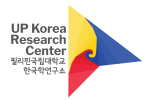On 09 September 2023, the UP Korea Research Center organized a talk for aspiring translators interested in working on Korean cultural content (i.e., webtoons, dramas, movies) and Korean literature (i.e., novels, short stories, poetry). Ms. Cassandra “Aya” Dela Cruz served as the guest speaker of the talk entitled “Lost in Translation: Getting Started as a Korean Literary and Screen Translator.” She recently completed the Literature Translation Institute of Korea’s Advanced Media Translation Course (2023) and the British Centre for Literary Translation’s Literary Translation Summer School (2023).
At the onset of her discussion, she defined K-translation as a translation of cultural exports of Korea such as K-pop, K-Drama, and even K-Fashion and K-beauty. Moreover, she stated that K-Translation may be divided into two parts: Korean literature which includes poetry and prose and Cultural Content which includes shows, movies, and webtoon.
In addition, Ms. Dela Cruz highlighted that there is a growing demand on the K-Translation industry since the late 1990s. Furthermore, the incorporation of Korean dramas and series into Netflix opened doors for bigger clients and markets in the western world. Hence, there will be vast opportunities that need to be explored in the field of K-Translation.
On the other hand, she pointed out that people who aspire to enter the industry of K-Translation and want to become a K-Translator must possess the following competencies: Language skills (both in English and Korean), cultural understanding, creative writing skills, and research skills. In addition, she added that a possession of TOPIK or certification in Korean proficiency may be deemed as an advantage but not a required skill in the field of K-Translation.
Subsequently, she provided an entry path for beginners and enthusiasts who want to explore the amazing journey of K-Translation. She started discussing formal education. Majors that interested students may pursue are Translation studies, Language studies (particularly Korean), or Linguistics. She also highlighted that aspiring K-translators may pursue professional training to enhance their Korean proficiency and language translation skills through enrollment to the Literature Translation Institute of Korea. Interested applicants may pursue a 2-year onsite program or a 1-year online program available during night schedule. Applications for the said program varies and seeking participants may look at the official webpage of the institute. She also mentioned other translation institutes such as the National Centre for Writing and The American Literary Translators Association.
The world of K-Translation may seem fun and exciting but there are also challenges that aspiring translators need to prepare for: biases against non-native speakers is eminent in any translation industry. Moreover, it might be difficult for newbie translators to find a consistent client since companies pursue established and veteran translators. Hence, new translators must remain diligent and competitive when it comes to their portfolios.

The lecture ended with a series of question and answers and Ms. Dela Cruz answered the queries of the participants. The session ended with the awarding of certificate of recognition to Ms. Dela Cruz as speaker for the event. During the event, Prof. Michael Manahan (UP Department of Linguistics) served as the moderator.
To watch the recorded lecturer: https://www.youtube.com/watch?v=J1S8azGmvx4
Prepared by: Raymond Barreno, Research Assistant of UP KRC.
